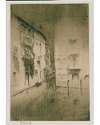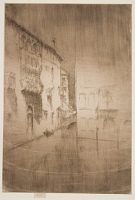Nocturne: Palaces | ||
| Number: | 200 | |
| Date: | 1879/1880 | |
| Medium: | etching and drypoint | |
| Size: | 298 x 202 mm | |
| Signed: | butterfly at lower left (12) | |
| Inscribed: | no | |
| Set/Publication: | 'Second Venice Set', 1886 | |
| No. of States: | 12 | |
| Known impressions: | 54 | |
| Catalogues: | K.202; M.199; W.168 | |
| Impressions taken from this plate (54) | ||
STATE
Twelve states are known before cancellation.
State 1

There is no signature or inscription.
The composition is basically complete; there is a faint 'X' over the top window on the palace at right and a larger faint 'X' on the lower right corner of that palace and the water in front of it.
The faint 'Xs' may indicate that Whistler was initially dissatisfied with the plate, leading him to incise light cancellation marks in the copper at an early stage in its development.
State 2

Vertical and diagonal lines are added above the roofline at left; more vertical shading is added at the top of the palace at right, and short diagonals are added along the left side of the façade; the wall of the centre palace, seen behind the bridge, is completely shaded; the space between the palaces, above the bridge, is more heavily shaded; shading is added to the bridge and to the shadows and reflections beneath it; the reflection beneath the door of the palace at right is enlarged; vertical drypoint lines of varying lengths are added to the water in the foreground.
State 3

The outline of the upper wall of the palace at right is more clearly defined; short vertical lines are added to the water below the palace at right, to the left of the patch indicating the doorway's reflection.
State 4

Short vertical lines are added under the eaves of the palace at left; short horizontal lines are added to the façade of the palace at right, along the left edge; two patches of horizontal lines are added to the reflections in the near foreground.
State 5

Short, slightly diagonal lines are added above the centre of the roofline of the palace at left; left to right diagonal lines (\\\) cross the space between the right end of that roofline and the palace at right, and another series of diagonals is added above the roof of the centre palace, seen behind the bridge; fine left to right diagonals are added to the shadow just above the bridge at left, and strong left to right diagonals are added to the shadow and reflection under the left side of the bridge; right to left diagonals (///) strengthen the reflection of the left side of the bridge, and there are new horizontal lines on the water below them.
State 6

A few drypoint lines darken the shading of the three top windows, door and arch above the door of the palace at left, and diagonal shading in both directions is added to the large shadow between the balcony and door; fine drypoint shading covers most of the central palace, seen behind the bridge; the lamp on the bridge is more clearly defined, as are the beams of light that emanate from it; very fine horizontal and diagonal lines are added to the lower left side of the bridge and to the reflections in front of it; heavier vertical lines are added to the gondola.
It is likely that there are new drypoint lines on the eaves of the palace at left, but other impressions were printed with so much ink in that area - as in the impression reproduced below - that it is difficult to be certain about new line work.
Published in this and later states by Messrs Dowdeswell and Thibaudeau with the Twenty-six Etchings (the 'Second Venice Set') in 1886.
State 7

Fine drypoint lines are added to the façade of the palace at the right, most notably on the front of the balcony, the shadow between the balcony and doorway, and the lighter space between the door and the arch above it; a series of left to right diagonals (\\\) are added to the front of the gondola's reflection; a few pale vertical drypoint lines enlarge the reflection below the doorway of the left palace, and a number of more widely spaced vertical lines reinforce the shading along the waterline, to the left of the gondola; another series of vertical drypoint lines widens the reflection immediately below the gondola.
State 8

Two sets of diagonal lines are added above the roofline of the palace step, to the left of and above the chimney; short diagonals are added to the right of the chimney, with a group of longer, more widely spaced diagonals above them; horizontal lines are added to the shading between the palaces, extending downward from the edge of the palace at right; left to right diagonal lines (\\\) are added to the shadow under the bridge and extend the reflection in front of it; the reflection of the left side of the bridge is darkened with right to left diagonals, and there are new horizontal lines below that reflection.
State 9

The shading under the eaves of the palace at left is darkened with additional drypoint lines, most notably at the left side, where the dark drypoint burr now extends closer to the edge of the image.
State 10

The dark shading under the eaves of the palace at left is extended further, to the left edge of the image, with slight diagonal drypoint lines.
Kennedy thought that some fine drypoint shading that was added in earlier states had been removed in this state. 8 However, the disappearance of those lines is most likely the result of wear, because other drypoint and etched lines in those areas are not disrupted.
8: Kennedy 1910 (cat. no. 202 state 7/9).
The impression illustrated above has bands of 'picking' in the plate-tone at the bottom of the image. Picking occurs during printing when a number of factors, including the viscosity of the printer's ink and uneven pressure, cause dots of ink to be lifted from the surface of the paper. In the case of the example shown here, the concentric circles of removed ink suggest that pressure may have been uneven, causing the copper plate to slip as it was rolled through the printing press.
State 11

Left to right diagonal lines (\\\) are added to the sky above the palace at left and on the upper left of the palace at right; fine shading in all directions is added to the balcony, the shadow beneath it and the doorway of the palace at left; diagonal shading is added above the waterline of the left palace, from the left side of the doorway to the gondola and upward to the window at the right of the dark shadow; the reflection of the left palace doorway is enlarged and now consists of three patches of shading; fine shading once again covers most of the centre palace, seen behind the bridge, and patches of shading in all directions are added to the bridge, itself; the shape of the shadow under the arch of the bridge is changed; the shadow and its reflection are more heavily shaded, and the shadow's reflection now extends in front of the bridge; many horizontal lines are added to the water, in front of the shadow under the bridge and across the reflections in the foreground.
State 12

Signed with a butterfly at lower left.
Considerable shading is added to the left side of the image, most notably: on the sky between the left and centre palaces and the wall of the right palace; under the eaves of the left palace; on the balcony, shadow and doorway of the left palace; on the centre palace, seen behind the bridge; around the beams eminating from the lamp; on the bridge, the shadow beneath it and its reflection; and on the reflection of the gondola.



